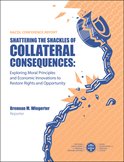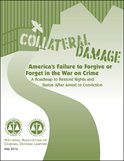The NACDL Foundation for Criminal Justice preserves and promotes the core values of the National Association of Criminal Defense Lawyers and the American criminal justice system.
Support Us NowRestoration of Rights
The consequences of conviction – specific legal barriers, generalized discrimination, and social stigma – have become more numerous and severe, more public, and more permanent. NACDL is proud to have several projects aimed at examining the collateral consequences of these convictions, including our 2014 report Collateral Damage, the 2018 Presidential Summit on collateral consequences, and our work to promote second chances at the state and federal level.
State Reform Reports and Programs Expungement Clinics Second Chance Month Criminalization of Voting
Additional Resources on Restoration of Rights
Background
Collateral damage occurs in any war, including America's "War on Crime." Ironically, our zealous efforts to keep communities safe may have actually destabilized and divided them. The vast expansion of the nation's criminal legal system over the past 40 years has produced a corresponding increase in the number of people with a criminal record. One study estimated that around 77.7 million individuals - nearly one out of every three American adults - have a criminal record. At the same time, the collateral consequences of conviction have become more severe, more public and more permanent. These consequences affect virtually every aspect of human endeavor, including employment and licensing, housing, education, public benefits, credit and loans, immigration status, parental rights, interstate travel, and even volunteer opportunities. Collateral consequences can be a defendant's most serious punishment, permanently relegating a person to second-class status. An arrest alone can lead to permanent loss of opportunity.
It is time to reverse this course. It is time to recognize that America's infatuation with collateral consequences has produced unprecedented and unnecessary collateral damage to society and to the justice system. It is time to celebrate the magnificent human potential for growth and redemption. It is time to move from the era of collateral consequences to the era of restoration of rights and status.
"The country was built on the belief that each human being has limitless potential and worth. Everybody matters. We believe that even those who have struggled with a dark past can find brighter days ahead. One way we act on that belief is by helping former prisoners who've paid for their crimes -- we help them build new lives as productive members of our society."
- Former President, George W. Bush
Common Mechanisms to Restore Rights & Status
"Ban the Box" - Fair chance hiring policies help to remove barriers to employment by prohibiting an employer from inquiring into an applicant's criminal background until after a conditional offer of employment. The best "ban the box" policies do the following: (1) are applied statewide; (2) apply to both public and private employers; and (3) have standards limiting criminal history inquiries to recent convictions with a business nexus to the job.
Expungement/Sealing - Expungement results in deletion of any record that an arrest or criminal conviction ever occurred. A sealed record is removed from general review; the record still exists and can be reviewed under limited circumstances.
Occupational Licensing - Reforms regulating the consideration of a criminal record by occupational licensing agencies.
Restoration of Voting Rights - An estimated 4.6 million Americans are denied the right to vote because of a felony conviction. Laws vary between states with some states permanently disenfranchising all people with felony convictions to states that restore voting rights upon completion of their sentence. Maine, Vermont, and Washington, DC, are the only states that do not disenfranchise people with a felony conviction.
Clemency & Pardons - Clemency is the power of a Governor to commute a prison sentence to a lesser term than was initially imposed. A pardon is a form of clemency meant to indicate forgiveness of a crime.
State Reform
Recent years have seen a national, bipartisan movement towards criminal justice reform that seeks to promote successful reentry and remove the collateral consequences of conviction faced by returning citizens. Across the country, lawmakers on both sides of the aisle are supporting policies designed to improve reentry outcomes, including expanding expungement eligibility and record sealing, easing restrictions on occupational licensing, and working to reduce unnecessary barriers to the successful reentry of people returning from periods of incarceration. In 2021, 40 states, the District of Columbia, and the federal government enacted over 150 pieces of legislation aimed at lessening the many obstacles to employment, housing, public benefits, voting, and many other areas of daily life that individuals with arrest and conviction histories face (Collateral Consequences Resource Center, 2022).
Consider joining NACDL’s State Criminal Justice Network (SCJN) to exchange information, share resources, and develop strategies for promoting criminal justice policies that offer meaningful second chances for formerly incarcerated individuals.
State Criminal Justice Network
NACDL is proud to have several projects aimed at examining the collateral consequences of these convictions. The goal is to provide policy recommendations and laud existing best practices that jurisdictions can engage in to effectively decrease the economic, political, and social stigmas associated with a criminal conviction.
Coalition Building to Restore Rights & Status
Free to Drive Coalition - Convened by the Fines & Fees Justice Center and Civil Rights Corps, the Free to Drive Coalition (of which NACDL is a member) is committed to the principle that restrictions on driving privileges - including suspensions, revocations, or renewals of driver's licenses or registration - should never be used to coerce debt payment or punish people who don't appear in court.
Fully Free: The Campaign to End Permanent Punishments - NACDL is a coalition partner of Fully Free: The Campaign to End Permanent Punishments. The campaign works to dismantle "the prison after the prison," the long-lasting barriers to housing, employment, education, civic engagement, and more faced by the estimated 3.3 million adults in Illinois who have been arrested or convicted of a crime.
Restoration of Rights Project
The Restoration of Rights Project (RRP) is a free online resource that includes summaries and analyses of state and federal law relating to restoration of rights and status following arrest or conviction. Maintained and regularly updated by the Collateral Consequences Resource Center (CCRC), the RRP covers four primary topics: civil and firearms rights; pardons; expungement and other record relief; and employment and licensing. A national page summarizes each jurisdiction’s laws, state-by-state profiles provide in-depth information, and 50-state comparison pages include charts and state-by-state summaries. CCRC’s work on the RRP and its derivative projects is supported by a grant from Arnold Ventures.
Learn more about the Restoration of Rights Project
Comprehensive Text on Collateral Consequences
NACDL Reports on Collateral Consequences
On August 23–25, 2018, the National Association of Criminal Defense Lawyers (NACDL) hosted its 17th Annual State Criminal Justice Network (SCJN) Conference and 2nd Annual Presidential Summit in Atlanta, Georgia — Shattering the Shackles of Collateral Consequences: Exploring Moral Principles and Economic Innovations to Restore Rights and Opportunity. On June 4, 2019, NACDL released its conference report and videos of the conference.
Shattering the Shackles Report
On Thursday May 29, 2014, NACDL launched Collateral Damage America's Failure to Forgive or Forget in the War on Crime - A Roadmap to Restore Rights and Status After Arrest or Conviction.
Over 100 people attended the report launch. Poignant testimony was provided by Lamont Carey, a business owner and individual with a conviction; several policy analysts; former Governor Robert Ehrlich; former Congressman J.C. Watts; and former New York City Police Commissioner Bernard Kerik who also has a conviction on his record.
Restoration of Rights Task Force Collateral Damage Report & Videos
Do you know that April is recognized as Second Chance Month?
Second Chance Month is a nationwide effort to raise awareness of the obstacles faced by over 70 million Americans with a criminal record and unlock opportunities for them to succeed. Since its inception in 2017, NACDL has been activitely involved in hosting activities and providing opportunities for its members to become engaged.















